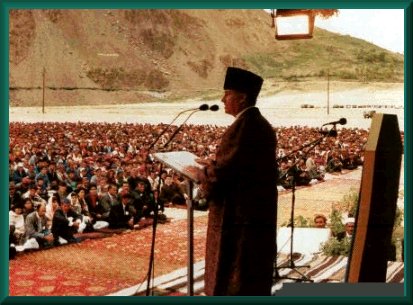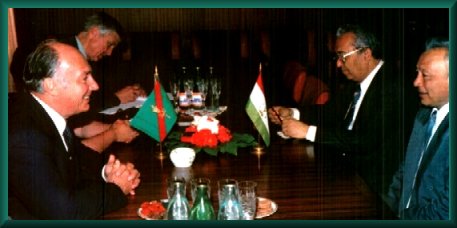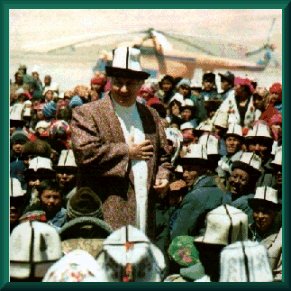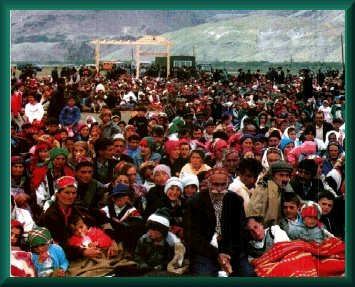 Mowlana
Hazar Imam's First Visit to Tajikistan Jamats
Mowlana
Hazar Imam's First Visit to Tajikistan Jamats
The Aga Khan in the Pamirs - High Hopes
Khorog, Tajikistan
- source The
Economist June, 1995 Asia Section
The Aga Khan is interested in more than racehorses and an elegant life. As 49th Imam of the Ismaili Muslims and direct descendant of Prophet Muhammad, he tries to give spiritual guidance and practical help to the 12-15 million Ismaili Muslims who are scattered through 25 countries. He does it partly through a network of development agencies in Asia and Africa widely admired for their small-scale, self-help approach. So in late May, His Highness Prince Karim Aga Khan went to meet, for the first time, his followers in the Pamir Mountains in the heart of Central Asia.
A crowd of about 60,000 people gathered to hear their Imam speak near Khorog, the capital of the province of Gorno-Badakshan in eastern Tajikistan. Many had walked for miles and most had slept out in the cold. For the mostly Ismaili people of the Pamirs, the Aga Khan is not only a spiritual leader but also the saviour who has fed them in the past two years, after a shortage of food and fuel had brought their corner of the world to the edge of starvation.
In the Soviet era, the Pamiris got education and health care as good as anybody in the Soviet Union could expect. But farming was neglected. Four-fifths of Gorno-Badakshan’s food and all its fuel came from outside the province, either by air or along two roads from the north (the routes into China and India had been closed in the 1930’s). The Soviet Union’s collapse ended the flow. Just as bad, the Pamiris supported the losing side in Tajikistan’s six-month civil war in 1992, and the winners who installed themselves in the capital, Dushanbe, have done little to help Badakshan.
So the Aga Khan’s people set up a small, locally run aid organization in Khorog. This has distributed more than 50,000 tonnes of wheat, rice, tea, fuel and other things since the start of 1993. But now the Pamir Relief and Development Programme (PKDP) has more ambitious plans. It hopes to make the area self-sufficient in food.
To increase food production, it was essential to transfer cultivable land from the inefficient collective farms to private control. The PKDP does not use the phrase “private ownership”, since this could revive land claims from pre-Soviet days, but it has encouraged the collective farms to turn over plots of land to private farmers on long, inheritable leases. And the amount of cultivable land has been increased by the building of small irrigation canals.
Even using the old seed varieties, this has produced wheat yields 12% higher than in Soviet time (and potato yields are up to 86% higher). The new high yield wheat varieties the programme has introduced to Badakshan this year should bring even better results. Patrick Peterson, the Aga Khan’s coordinator of rural development programmes, guesses that the region might be self-sufficient in food eight years from now.
And soon Badakshan may feel less isolated. The Aga Khan says he will help with feasibility studies for a road to connect it to Pakistan, via Afganistan’s Wakhan corridor. This would give the Pamiris access to their fellow Ismailis in northern Pakistan, not to mention that country’s busy bazaars.
 Speech
made by Mawlana Hazar Imam at a public meeting at the Concert Hall - Dushanbe,
Tajikistan, 27 May 1995
Speech
made by Mawlana Hazar Imam at a public meeting at the Concert Hall - Dushanbe,
Tajikistan, 27 May 1995
Your Excellency President Rakhmanov
Distinguished Guests
Dear Friends
Today's gathering is a remarkable event. It brings together people from the many parts of Tajikistan, a country that, though small, has a rich and challenging diversity. It brings together representatives of a variety of neighboring and distant countries that wish well the people of Tajikistan. It brings together religious and secular leaders deeply concerned with the future of Tajikistan’s people.
It marks the entry of Tajikistan into a world of opportunity, of competition and of rapid change. It marks the serious engagement of Tajikistan with the means of meeting those challenges and making the most of those opportunities.
I come to this visit and to this gathering with the hope that, as Imam of the Ismaili Community, I can be of some help in furthering the efforts of Tajikistan’s people in improving their lives. Tajikistan has sought and doubtless will seek collaboration and help from many quarters, and appropriately so, but I should be pleased if the people of Tajikistan found me as one of the effective sources of such help.
In order to open the way to that possibility, perhaps I should not finish my visit to Tajikistan without describing something about the role of the Imam of the Ismaili Community and the principles by which the Imamat works to fulfil its role in these modern times. I suspect that if we have a shared understanding of the Imamat and its functioning, we shall find it easier to identify areas of common ground and fruitful future cooperation.
Six principles from the foundation of the Imamat’s work in development : breadth of responsibility, an apolitical stance, pluralism, a long view, work across disciplinary boundaries, and work across political boundaries. The breadth of responsibility is based on the belief in Islam that people must attend to both their spiritual development and their physical needs. The apolitical stance is in recognition that there is value in listening to the widest spectrum of culture, religious, economic and political views, seeking wisdom where ever it is to be found. Embracing pluralism, I have found that a wonderful variety of people can collaborate effectively in the advancement of the well-being of people around the world. The long view is an acknowledgement that fundamental profound changes are needed to permanently improve the circumstances of people usually take time, so one should not shy away from undertakings with a long time course. Working across disciplinary boundaries allows for synergy of efforts, as when improvements in health and enhancement of economic circumstances improves opportunities for better health and education. Working across political boundaries allows the crafting of regional solutions of problems that cannot be solved locally, as the Aga Khan Development Network has found in its work in East and West Africa and South Asia.
It is with these principles in mind that during this visit I have examined the situation of the peoples of Tajikistan in order to determine whether and how I might be of help, in addition to assisting the Pamir Relief and Development Program in converting from humanitarian relief to long-term development. Indeed, I have concluded that some possibilities do exist. Clearly these possibilities will need to be tested carefully by the national and regional Governments in Tajikistan, and by local institutions that would be involved, to make sure that others share my interest in them. But let me take the opportunity now to offer several possibilities.
First, in response to the need to enhance the strength of Tajikistan’s universities in certain critical disciplines, I would be willing to create an Education Fund to support training in English language and Economics. Such a fund would extend over a two-year interval and be focused particularly on faculty training. It would be available to universities throughout Tajikistan.
Second, recognizing the specific possibilities at the University of Khorog, I am prepared to help fund a long-term development plan for that University. This plan would, I hope, lead the University of Khorog to a position as a major regional resource with a strong teaching and research program in disciplines of particular importance for the people of Tajikistan.
Third, convinced of the importance of opening regional transport linkages for Tajikistan, I would like to cooperate with the Government. Tajikistan through Afghanistan to Pakistan. Considerable study will be required of the technical and economic features of such a project, but the need is clear, and I shall do my best to support the efforts of the governments involved.
Fourth, in the interest of forwarding Tajikistan’s efforts to participate successfully in the market economy, I offer to help create a Badakhshan Development Fund. This fund would be a joint initiative of the Aga Khan Fund for Economic Development and the Government of Tajikistan. The activities of the joint initiative might involve efforts in industry, mining, financial services or infrastructure.
These four initiatives, and others that might be envisioned in the future, are conceived to address the needs of the people of Tajikistan in a manner consistent with the principles of action of the Imamat. If these initiatives, President Rakhmanov, are found by your Government also to be consistent with the appropriate principles of the Government of Tajikistan and institutions within its boundaries, then real progress can be realized.
This visit to Tajikistan, so kindly hosted by President Rakhmanov, has taught me much about Tajikistan and its people. I have been deeply impressed by the spirit of the people of Tajikistan, with their energy, their intelligence and their resilience. You are fortunate, indeed, President Rakhmanov to lead such an impressive population - and I am fortunate to have the prospect of continuing collaboration with you and them.
 Speech
made by Mowlana Hazar Imam at a dinner in honor of President Askar
Speech
made by Mowlana Hazar Imam at a dinner in honor of President Askar
Akayev - Bishkek, Kyrgyz Republic, 30 May 1995
Your Excellency the President
Your Excellencies the Speakers
Your Excellency the Vice Prime Minister
Distinguished guests
Thank you, President Akayev, for your warm welcome. I am both exhilarated and moved to be here. Just a few years ago, this visit would have been unthinkable . Political orthodoxy divided the world into sharply defined, opposing camps and religious affiliations were suspect. Someone in my position would have known - through books - of the Islamic scholarship which flourished in Osh in the 10th century. In the same way, he would be aware of the vibrant Kyrgyz culture and oral traditions incarnated in the Manas epic, which you will shortly be commemorating. But he could never have dreamed of catching a glimpse of the inspiringly beautiful mountains, lakes and forests with their eternal Jupiter trees, which form your Altyn Beshik. Or of coming here to learn first-hand of the economic reforms which your Government has pioneered in Central Asia.
 No
one can deny that we are living in exceptionally stirring times. Mutation
is rapid, the search for direction is omnipresent in all societies, and
the Muslim Ummah is seeking its position in the community of nations.
No
one can deny that we are living in exceptionally stirring times. Mutation
is rapid, the search for direction is omnipresent in all societies, and
the Muslim Ummah is seeking its position in the community of nations.
The end of the Cold War has brought new opportunities and new challenges, while rekindling in some places the ambers of long buried tensions. Though the risk of global war, fortunately, has subsided, historical, religious, ethnic or clan rivalries have reignited local conflicts in Rwanda, former Yugoslavia, the Caucasus, and in places even closer to the Kyrgyz Republic. The horizons of the unfortunate people caught up in such dramas are limited, momentarily, to survival.
If deep and universal human yearnings for an improved quality of life are to be met, statesmen and communities must find solutions to these poisoned legacies and to other forms of violence frequently linked to the cancerous drug trade. For it is only within a framework of peace, internal consensus, stability and orderly processes of change that nations can take full advantage of the energy and creativity of their citizens, of new technologies, and of the financial resources that can be liberated and turned to more productive purposes than threatening or killing neighbors or fellow countrymen.
In this era of deep and accelerating changes, I see a few dominant realities which face all countries, including the Kyrgyz Republic, as well as one specific to the Muslim Ummah.
The first reality is the need to face growing competition, which is evident, globally, across the whole spectrum of human endeavor -from individual enterprises to large trading blocks. In affirming that societies, like individuals, must be ready to progress in a competitive world, I am neither advocating - nor defending - excesses of greed or frontier capitalism without a social conscience. Not very far from here, in Northern Pakistan, is a remarkable example of what can be achieved by poor, isolated villagers on their own behalf, have established several thousand small, grassroots organizations, democratically run, to identify development priorities; create infrastructures; augment their skills; and save. In the process, they have doubled their incomes and applied a portion thereof to building, managing and helping to pay for the health, educational and other social services which they want. To compete successfully, as the Asian Tigers have demonstrated on a larger scale, countries must equip themselves with the necessary human, institutional and financial resources and infrastructure. Moreover this must - and can - be done in a way which is both sensitive to, and respectful of local cultural traditions and ethos. This is why the Aga Khan Development Network seeks to promote a holistic approach which combines cultural as well as social and economic interventions.
 The
second reality which appears inescapable in today’s shrinking and increasingly
competitive world is the impossibility of autarchy, especially economic
autarchy. Small may be beautiful, but size matters. So it is that many
countries, even big and economically powerful ones, are coming together
in larger economic groupings. I share your vision, President Akayev, that
the way forward will require continued, imaginative efforts to link the
Kyrgyz Republic’s human and economic potential - whether in tourism, hydroelectricity,
minerals or agriculture - within an appropriate regional context. Such
efforts would henceforth be based on pragmatic considerations of economic
interest and complementarities, and would include countries with which
the Kyrgyz Republic has had close economic links as well as other neighbors
with whom contacts of any kind have been virtually impossible for most
of this century. My Network is deeply interested in, and supportive of
these processes in the high mountain areas of Central Asia.
The
second reality which appears inescapable in today’s shrinking and increasingly
competitive world is the impossibility of autarchy, especially economic
autarchy. Small may be beautiful, but size matters. So it is that many
countries, even big and economically powerful ones, are coming together
in larger economic groupings. I share your vision, President Akayev, that
the way forward will require continued, imaginative efforts to link the
Kyrgyz Republic’s human and economic potential - whether in tourism, hydroelectricity,
minerals or agriculture - within an appropriate regional context. Such
efforts would henceforth be based on pragmatic considerations of economic
interest and complementarities, and would include countries with which
the Kyrgyz Republic has had close economic links as well as other neighbors
with whom contacts of any kind have been virtually impossible for most
of this century. My Network is deeply interested in, and supportive of
these processes in the high mountain areas of Central Asia.
I cannot close without a final reflection on the Muslim Ummah which
has undergone a long period of considerable turmoil. The last two-hundred
years have seen variegated experiences from political, economic and scientific
domination by colonial powers, to isolation under highly traditional forms
of governance, even of living under conditions of active hostility to the
exercise of the faith. Not surprisingly, there are, throughout the Ummah,
strong and legitimate aspirations to be - once again -
a respected and central player on the stage of world civilizations.
In bringing these aspirations to fruition, I am struck by the close
relationship which exists in Islam between intellect and the faith. During
the glorious periods of Muslim history, Muslim thinkers, scientists and
philosophers were beacons of light, sharing their knowledge freely with
the non-Muslim world, indeed often leading it. I am convinced that the
way for the Ummah to achieve its aspirations is through the development
of first-rate institutions and professionals, steeped in the ethos of
the faith, but applying their intellects and resources to help humanity
develop solutions to the very. real problems facing it today - such as
population growth, sustainable resource management, environmental degradation,
the ethics governing new scientific capacities, or the creation of just
civil societies without exclusions.
With your background, President Akayev, the atmosphere of political
and religious tolerance which exists in your country, and your courage
to innovate, it is my fervent hope that the Kyrgyz Republic will soon be
in a position to contribute significantly to this enhanced role of the
Ummah and to the well-being of its peoples.
![]() Mowlana Hazar Imam's Visit
to Tajikistan in 1998
Mowlana Hazar Imam's Visit
to Tajikistan in 1998
![]() His
Highness the Aga Khan - Birthday Tribute
His
Highness the Aga Khan - Birthday Tribute

| Present Imam Shah Karim Aga Khan IV| 48th Imam Mowlana Sultan Mahomed Shah Aga Khan III | Hazrat Ali | Prophet Muhammad | Ismaili Heroes | Navigation Tool | Poetry | Audio Page | History | Women's Page | Legacy of Islam | Current Events |
